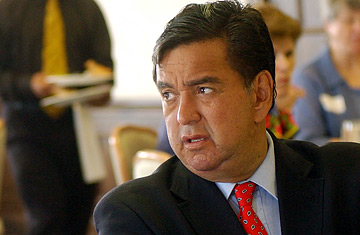
New Mexico Governor and Democratic candidate for President Bill Richardson on a campaign stop in Des Moines.
Cynthia Narvaez's family moved to Iowa from Mexico 15 years ago with a few suitcases of clothing and one hot plate on which her mother cooked everything from coffee to oatmeal to tortillas, when they could find them. Until Tuesday, Narvaez had never encountered a political candidate that seemed to understand her long-held sense of never quite feeling at home. Then she saw New Mexico Governor Bill Richardson speak.
"I had no idea until tonight that he's Hispanic," said Narvaez, 26, who was so inspired by his performance that she plans on changing her party registration from Republican to Democrat just so she can caucus for Richardson as he seeks the Democratic presidential nomination.
Richardson's talk, at the Wells Fargo Hola Diversity conference in Des Moines, is part of his quiet wooing of Iowa's Latino vote. In a midwestern state where immigration is hot-button issue, Richardson is walking a fine line, trying to attract support from the state's small but growing Hispanic population while convincing Iowans leery of illegal aliens that he will not throw open U.S. borders to Mexico.
And he knows the dilemma he faces. "I don't like immigration as it's playing today," Richardson told the Wells Fargo audience. "Everywhere I go everywhere, everywhere I campaign, there's somebody in the audience, somebody gets up and says: Governor, how do you feel about immigration?' And deep down I feel like they are worried, that they're thinking: He's Hispanic and he's going to open the border.'"
The son of an American father and a Mexican mother, Richardson spent his early years in Mexico City. And while he's quick to underline that he's running a national campaign, he is also playing to his strengths. That means reaching out to Latino voters in early-voting states like Nevada, Florida and California where Hispanic populations have the highest density in the country, as well as in Iowa.
Latinos have become the state's largest minority, making up 3.7% of the population in 2005. Banking, restaurant menus and even voter registration cards are now offered in Spanish, but Hispanics' emergence has not been without friction. Over the years Iowans have grown fearful that the immigrants brought in by the state's hog farms and hospitality industry are dragging down their minimum wages and taking jobs they might want, said Paula Martinez, who sits on the Iowa Democratic Central Committee. And the immigration debate, in turn, has helped make the Hispanic community "incredibly" active, according to Armando Villareal, administrator of the Iowa Division of Latino Affairs in Des Moines. "We had 15,000 people in the streets during the May protests, and for a state as small as Iowa, that's amazing," Villareal said.
Richardson recognizes how important that segment of voters could be, but he's also careful not to stress it too much. He does have six bilingual staffers on the ground, has already reached out to Latino groups, and he's the only candidate to grant El Latino, Des Moines' 5,000-circulation Hispanic weekly, an interview, done in Spanish. And, "when the time's right, we'll start advertisements" targeting Latin voters, he told TIME Wednesday morning over a breakfast of scrambled eggs and sausage. At the same time, he says that Hispanic outreach in Iowa is "important but it's not a crucial element... I'm running a very mainstream campaign, I'm trying to appeal to all Iowans, but the Hispanic community here, if we increase participation, like double it, it could mean the difference between a second- or third-place finish."
On Tuesday, as he spent four-plus hours shaking hands at the Iowa State Fair in 95-degree heat, the delicate dance Richardson faces was on full display. "You're pretty tall to be a Mexican," one Iowan told Richardson, dressed in jeans and cowboy boots. At the fair's traditional soapbox, a must-hit event for all presidential hopefuls, Richardson — predictably — was asked about his stance on illegal immigration. With rivulets of sweat making their way across his neck and chin, he launched into his four-point plan on how to solve the immigration problem, which includes punishing employers for hiring illegal immigrants and enforcing the borders — though not with the help of a fence. "I believe if you build a 12-foot fence you'll get an awful lot of 13-foot ladders," he said.
To illustrate his third point, Richardson grabbed a young woman from the audience to play the role of the President of Mexico. "The United States will work with you" to develop higher-paying jobs in Mexico, said Richardson. "But you've got to work with us, too," he said gesturing to the embarrassed woman. "At least stop giving out the maps for border crossings."
Finally, Richardson advocates a path to citizenship for the estimated 12 million illegal immigrants living in the U.S., similar to the compromise legislation that was killed in Congress this spring. His plan, and its flourished delivery, won applause from the audience and a second look from Sandra Johnson, 54, of Washington, Iowa. "I'd ruled him out," Johnson said, sitting on a bale of hay that served as seating at the Soapbox arena. "But I realize now he's got a lot of experience as a governor of a border state. It gives him more credibility on the issue." The question for Richardson is whether he has enough of it to win support from two sides that rarely find much to agree on.
